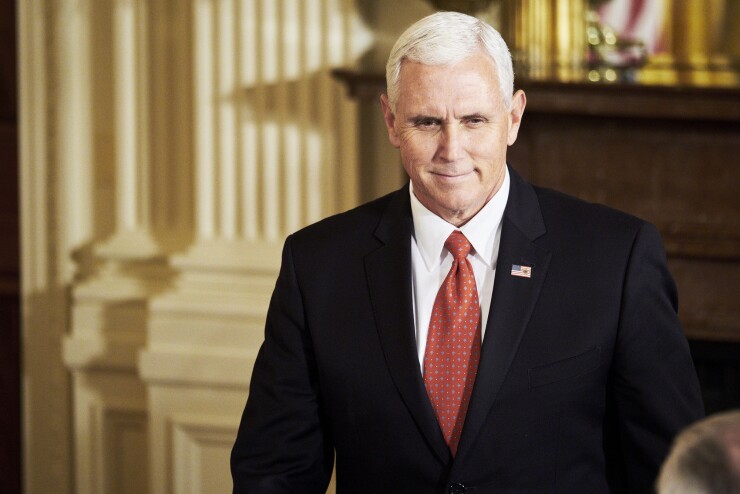Vice President Mike Pence said Republicans would repeal the estate tax—a step that the Senate GOP tax plan doesn’t currently plan to take.
“Death should no longer be a taxable event,” Pence said Thursday night during the annual dinner of the Tax Foundation, a conservative-leaning Washington policy group. He promised that the tax-overhaul plans now under consideration in Congress would eliminate the levy—a long-sought Republican goal.
Pence also promised his audience that Congress would repeal the Affordable Care Act’s requirement that individuals buy health insurance—a provision that Senate tax writers have added to their plan but the House hasn’t included.

“We will repeal the death tax once and for all and cut taxes on working Americans when we repeal the Obamacare individual mandate in this bill,” Pence said.
He also called for creating a new 25 percent tax rate on partnerships, limited liability companies and other so-called “pass-through” businesses. That’s in the House bill, but not the Senate plan, which would use a different approach.
The vice president’s mix-and-match promises contradicted White House Press Secretary Sarah Huckabee Sanders’s earlier response to a question about differences in the two chambers’ plans. Sanders told reporters Thursday afternoon that President Donald Trump likes both the Senate and the House plan, and doesn’t prefer one over the other.
The two chambers will have to compromise on a final bill before it could reach Trump’s desk.
The House on Thursday passed an ambitious tax overhaul that would include a provision to repeal the estate tax in 2025. But the Senate plan, which remained under discussion by the Senate Finance Committee Thursday night, would leave the tax in place.
Tax Thresholds
Under current law, the estate tax applies a 40 percent levy to estates worth more than $5.49 million for single individuals and $10.98 million for couples. The bill approved by the House would double the exemption thresholds for the tax, and then repeal it. The Senate measure would also double thresholds, but that change would be temporary, and end in 2026.
The Senate Finance panel is also considering the repeal of the individual mandate that was part of the 2010 health care law known as Obamacare. Abolishing the mandate beginning in 2019 would save the federal government $318 billion over 10 years that would help pay for the deep tax rate cuts that Republicans want to enact. But it would also leave 13 million Americans uninsured by 2027, according to an estimate by the Congressional Budget Office.
The chambers are also divided on how to cut taxes for closely held businesses that are organized as pass-throughs. Such businesses don’t pay tax themselves, but pass their earnings to their owners, who then pay tax at their individual tax rates.
The House legislation would tax some such businesses at 25 percent—and provide additional breaks for smaller businesses. The Senate plan would take a different approach, granting pass-through owners a 17.4 percent deduction—up to a certain threshold—before taxing the income at their individual rates.
Different Plans
Senate leaders have said they plan to hold a floor vote on their bill during the week of Nov. 27. But several Senators have already expressed concerns about aspects of the proposal—including pass-through tax treatment, the inclusion of the individual mandate repeal, and the impact the entire plan could have on federal budget deficits.
Pence said the ultimate tax bill would be the “biggest tax cut in American history” and pass before the end of the year. But recent studies suggest that the tax plans—both of which would reduce federal revenue by $1.4 trillion or so before accounting for any larger economic effects—would be shallower than those enacted in 1981 under then-President Ronald Reagan.





